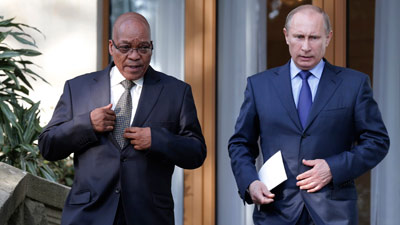
South Africa is facing two or more months of unpredictability and instability even worse than we experienced during the tumultuous late 1980s and early 1990s.
President Jacob Zuma has become like an uncontrolled ballistic missile with multiple warheads. He can explode anywhere.
It is abundantly clear that Zuma doesn’t give a damn any more whether his actions hurt his party or the country.
For the first time since 1994 there is a chance – an outside chance, but a chance nevertheless – that the president could openly defy the courts and publicly give Parliament and the Constitution the middle finger.

There is a real chance that we could witness politically inspired violence before, during and after the ANC’s elective conference that starts in Midrand on 16 December.
There is also a chance that the conference could be cancelled and postponed, especially if it appears to Zuma that his preferred candidate, Nkosazana Dlamini-Zuma, and his slate of top six candidates and members of the national executive committee (NEC) could be defeated.
The postponement or collapse of the conference through violence or court actions will sharply increase the uncertainty and instability, something the fragile South African economy cannot afford.
The citizens, business community and investors have their eyes on mid-December as the moment when South Africa will change course.
Zuma’s shock appointment of his de facto prime minister and Rottweiler-in-chief, David Mahlobo, as energy minister is a taste of what could happen next.
Despite the expected denials, we cannot simply discard the Sunday Times report that Russia’s Vladimir Putin sent a delegation to Zuma a day or so before the Cabinet reshuffle to demand that the R800 billion plus agreement Zuma’s emissaries had signed with state nuclear giant Rosatom now be implemented.

It is also no surprise that Putin demanded that Mahlobo, his point man in South Africa, be appointed to oversee the process leading up to the building of several nuclear power stations. Mahlobo has become very at home in the Kremlin.
People who claim to have inside information say that packs of US dollars, worth a quarter of a billion rand had been delivered to Zuma some months ago. They claim some of the money was meant for the ANC itself.
Nobody, but nobody, messes with Vladimir Putin, as people who have crossed him can testify – at least those who are still alive.
He must find Zuma’s explanations of court orders and parliamentary processes as reasons for the delays simply annoying, or amusing at best – such democratic niceties don’t exist in Moscow.
But Mahlobo and Zuma must know that the Western Cape High Court has declared the agreements with Russia invalid and ordered the process to restart. Also, that they will be fought tooth and nail via the courts and otherwise if they want to force their plans through.
So, what are they planning? Ignore the courts? Steamroller it through?
There is a suggestion that this whole saga has more to do with a gas exploration deal with Russia, but that is small fry and low risk for South Africa.
Would they perhaps sell the nuclear power deal by structuring it as a kind of “vendor financing scheme” so we won’t pay up-front for the power stations, but it would be financed by Russia and we would pay it off through paying for (very expensive) electricity?
Meanwhile it is as clear as glass that renewable energy is developing at such a rate and becoming cheaper every year, so that by the time the first nuclear station is switched on in twelve years or so it will be a massive white elephant.
It is entirely possible that, as a Ramaphosa insider has suggested, Zuma is planning to fire him in the next few weeks and perhaps even replace him with Dlamini-Zuma. In other words, pull a Thabo Mbeki (He fired Zuma as his deputy in 2005 because of allegations of corruption.)
If Zuma does fire Ramaphosa, it is predictable that he would present a fictitious “intelligence report” (as he did when he fired Pravin Gordhan) with “proof” that he conspired with Western countries against South Africa.
The rumour mill on social media is already suggesting that there exists a “damning” video of Ramaphosa and that he is responsible for the investigations into the Guptas launched by the American FBI and the British Serious Fraud Unit “to discredit Dlamini-Zuma”.
Depending on how many ANC members in branches believe that, this could actually strengthen Ramaphosa’s candidature because he would have more time and freedom to campaign and wear the jacket of a victim of the corrupt Zuma/Gupta cabal.
Another Cabinet reshuffle before December to get rid of Zuma’s last opponents, especially Communist Party members, is also possible, bringing even more uncertainty and instability.
Zuma is presently driving a process that seeks to emasculate national treasury and move important decision-making functions to the Presidency.
This will make looting of the state coffers much easier and will horrify rating agencies and investors.
Last week also saw Zuma’s proxies in Cabinet and the ANC’s parliamentary caucus trying to stymie the Eskom investigation. Cabinet members like Bathabile Dlamini, Mosebenzi Zwane and Lynne Brown showed Parliament the middle finger.
It doesn’t seem as if NPA boss Shaun Abrahams will be able to find a legal excuse at the end of November why he should not bring criminal charges against Zuma. That will bring more desperation on Zuma’s part.

These are disturbing thoughts. And yet I still believe our institutions – the judiciary, civil society, media, faith communities – as well as activists inside and outside the ANC (and Parliament) are strong enough to stop the wheels from coming off.
Faced with this ugly scenario of wrecking-ball Zuma in full force, some ANC figures are increasingly inclined to favour an alternative where the results of the December conference are pre-negotiated to avoid a huge bust-up, Zweli Mkhize becomes the new ANC president as the unity candidate and candidates from both camps are accommodated in an enlarged Top 6 and in the NEC.
It is attractive because it will probably avoid further uncertainty and instability, although it would mean the divisions in the governing party will continue to paralyse it.
But if that agreement includes a Zuma exit early next year, I would favour it too if I were an ANC delegate.
By MAX DU PREEZ

